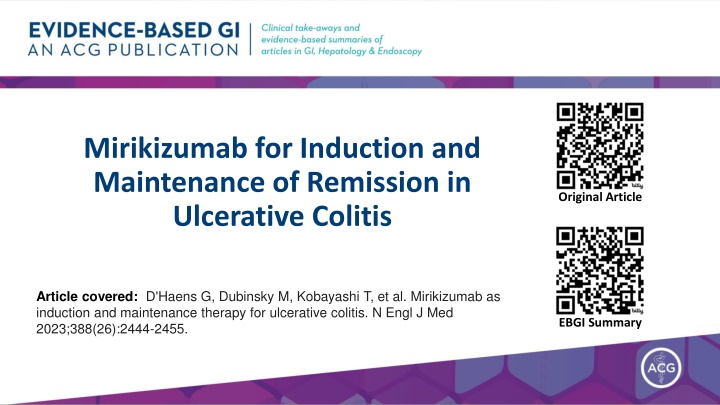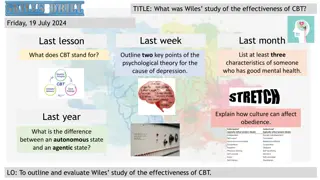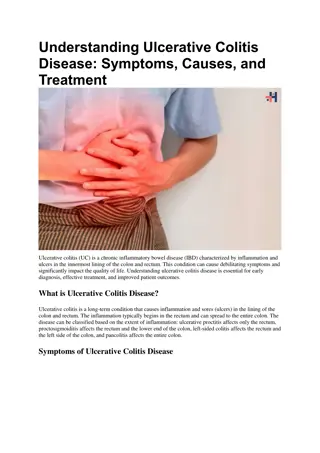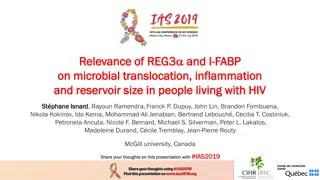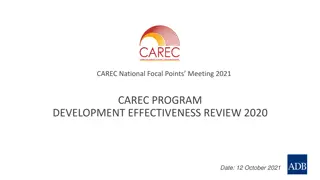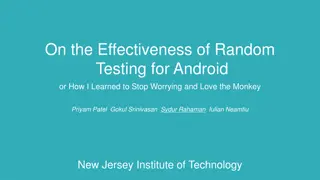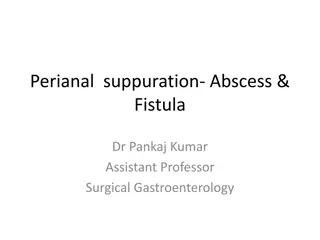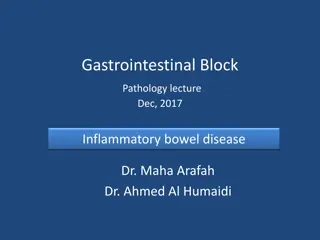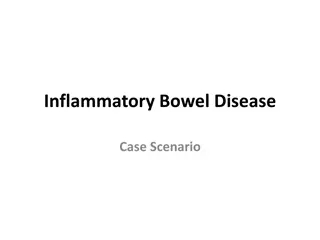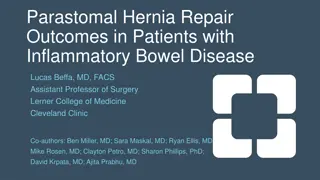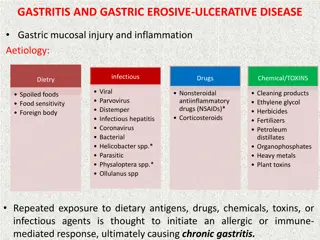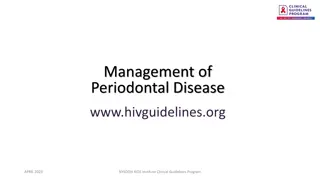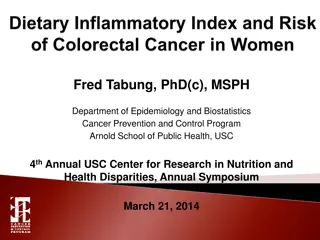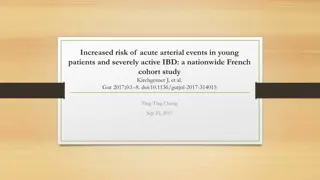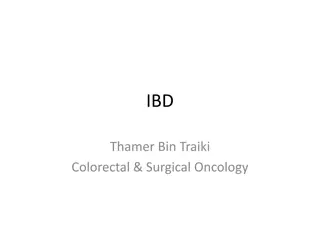Effectiveness of Mirikizumab in Ulcerative Colitis
Mirikizumab, a monoclonal antibody targeting the p19 subunit of IL-23, shows promise in inducing and maintaining remission in moderate-severe ulcerative colitis. This study explores its efficacy and safety in this patient population, presenting data from multicenter phase 3 trials.
Download Presentation

Please find below an Image/Link to download the presentation.
The content on the website is provided AS IS for your information and personal use only. It may not be sold, licensed, or shared on other websites without obtaining consent from the author.If you encounter any issues during the download, it is possible that the publisher has removed the file from their server.
You are allowed to download the files provided on this website for personal or commercial use, subject to the condition that they are used lawfully. All files are the property of their respective owners.
The content on the website is provided AS IS for your information and personal use only. It may not be sold, licensed, or shared on other websites without obtaining consent from the author.
E N D
Presentation Transcript
Mirikizumab for Induction and Maintenance of Remission in Ulcerative Colitis QR Code Original Article QR Code Article covered: D'Haens G, Dubinsky M, Kobayashi T, et al. Mirikizumab as induction and maintenance therapy for ulcerative colitis. N Engl J Med 2023;388(26):2444-2455. EBGI Summary
Study Question Is mirikizumab, a monoclonal antibody directed at the p19 subunit of IL-23, effective for induction and maintenance of remission in patients with moderate- severe ulcerative colitis (UC)? D Haens, et al. N Engl J Med 2023;388(26):2444-2455. Dalal R. Evidence-Based GI Jan 2024: 1-6.
Why Is This Important? Although many medications are available for treatment of moderate to severe UC, many patients fail to achieve or lose response over time. The use of many medications, including anti-TNF agents, is limited by the risk of infection and malignancy. The interleukin-23 (IL-23) pathway is a target to treat autoimmune disorders while minimizing adverse effects. Ustekinumab, which targets the p40 subunit of IL-12 and IL-23, was the first IL-23-directed monoclonal antibody approved for treatment of UC and Crohn s disease. D Haens, et al. NEJM 2023;388:2444-2455; Dalal R. Evidence-Based GI January 2024: 1-6
Why Is This Important? Hypothetically, selective blockade of the p19 subunit of IL-23 will produce better outcomes vs broader blockade of the p40 subunit of IL-12 and IL-23. Risankizumab, a p19 subunit focused IL-23 monoclonal antibody, is superior to ustekinumab for Crohn s disease. Mirikizumab is the first p19 subunit focused IL-23 agent approved by the FDA for UC based on LUCENT-1 and LUCENT-2 RCTs. D Haens, et al. NEJM 2023;388:2444-2455; Dalal R. Evidence-Based GI January 2024: 1-6
Study Design Design: Multicenter, phase 3, 12-week (LUCENT-1) and 40-week (LUCENT-2), double-blind, placebo-controlled, randomized controlled trial Setting: 384 and 367 centers in 34 countries, conducted from October 2018 through November 2021 Patients: Included 1,281 and 544 patients in LUCENT-1 and LUCENT-2, respectively, with moderate to severe ulcerative colitis MIRKIZUMAB RESPONSE at WEEK 12 LUCENT-1 PLACEBO MIRKIZUMAB CLINCAL OUTCOMES (WEEK 40) LUCENT-2 PLACEBO INCLUSION CRITERIA 18-80 years of age with moderate to severe ulcerative colitis D Haens, et al. NEJM 2023;388:2444-2455; Dalal R. Evidence-Based GI January 2024: 1-6
Interventions LUCENT-1: Mirikizumab 300 mg intravenously vs placebo IV every 4 weeks for 12 weeks LUCENT-2: Mirikizumab 200 mg subcutaneous vs placebo every 4 weeks for 40 weeks D Haens, et al. NEJM 2023; 388:2444-2455; Dalal R. Evidence-Based GI January 2024: 1-6
Outcomes & Definitions Primary Outcome Clinical remission at week 12 in LUCENT-1 Clinical remission at week 40 (week 52 overall) for LUCENT-2 Clinical remission defined as stool frequency score of 0-1, rectal bleeding score of 0-1, and endoscopic score of 0-1, based on modified Mayo Score. Secondary Outcomes Clinical response Endoscopic response Improvement in bowel movement urgency using Urgency Numeric Rating Scale D Haens, et al. NEJM 2023;388:2444-2455; Dalal R. Evidence-Based GI January 2024: 1-6
Results Total of 1,281 and 544 patients with moderate to severe ulcerative colitis were randomized in LUCENT-1 and LUCENT-2, respectively. Mean age: 41-43 years old; 56-61% male Disease characteristics: disease duration 6.9-7.2 years; left-sided colitis 63-64%; previous treatment failure with biologics 40-42% or inadequate response to biologics 23-24%. Mirikizumab-treated patients more likely to achieve clinical remission after 12 weeks: 24.2% vs 13.3%, respectively, p < 0.001. Mirikizumab-treated patients more likely to maintain clinical remission over 40 weeks: 49.9% vs 25.1%, respectively, p < 0.001. D Haens, et al. NEJM 2023;388:2444-2455; Dalal R. Evidence-Based GI January 2024: 1-6
Results LUCENT-1: Induction Endpoints (week 12) Mirikizumab Placebo 70% 63.5% 60% 50% 42.2% 40% 36.3% 30% 27.1% 24.2% 21.1% 20% 13.9% 13.3% 10% 0% Clinical Remission Clinical Response Endoscopic Remission Histologic-Endoscopic Mucosal Improvement D Haens, et al. NEJM 2023;388:2444-2455; Dalal R. Evidence-Based GI January 2024: 1-6
Results LUCENT-2: Maintenance Endpoints (week 40) Mirikizumab Placebo 70% 63.6% 58.6% 60% 49.9% 50% 44.9% 43.3% 42.9% 40% 36.9% 29.1% 30% 25.1% 25.0% 21.8% 21.8% 20% 10% 0% Clinical Remission Glucocorticoid-free Clinical Remission Maintenance of Clinical Remission Endoscopic Remission Histologic Endoscopic mucosal Remission Bowel-Urgency Remission D Haens, et al. NEJM 2023;388:2444-2455; Dalal R. Evidence-Based GI January 2024: 1-6
Results Adverse events similar in the mirikizumab and placebo groups. Six cases of herpes zoster in the mirikizumab group (compared to 1 in control) In mirikizumab group, CRC reported in two patients during 12-week induction period and unlikely related to drug. Non-melanoma skin cancer and gastric cancer reported in one patient each during 40-week maintenance period. Zero cancers reported in placebo group. D Haens, et al. NEJM 2023;388:2444-2455; Dalal R. Evidence-Based GI January 2024: 1-6
Key Study Findings Patients taking mirikizumab were more likely to achieve and maintain UC clinical remission compared to placebo-treated patients. Patients taking mirikizumab were more likely to achieve clinical response and endoscopic response. First study to report and demonstrate improvement in bowel movement urgency using the Urgency Numerical Rating Scale. Similar rates of adverse events in both groups D Haens, et al. NEJM 2023;388:2444-2455; Dalal R. Evidence-Based GI January 2024: 1-6
Study Limitations Numerically more cancer and herpes zoster in mirikizumab arm. Long term data needed to further assess safety profile. Comparative studies with IL-23 agents and other biologics needed to determine optimal placement of mirikizumab among IBD medications. D Haens, et al. NEJM 2023;388:2444-2455; Dalal R. Evidence-Based GI January 2024: 1-6
How Should We Apply This to Our Practice? Where should mirikizumab be placed in moderate-severe UC management compared to other therapies? Is ustekinumab preferable since it s dosed every 8 weeks? Is mirikizumab preferable because it s directed at the p19 subunit of IL-23? Should we consider mirikizumab in patients with secondary loss of response to ustekinumab or use agents with different MOAs? Should mirikizumab be considered as a first option for UC patients with significant fecal urgency? D Haens, et al. NEJM 2023;388:2444-2455; Dalal R. Evidence-Based GI January 2024: 1-6
